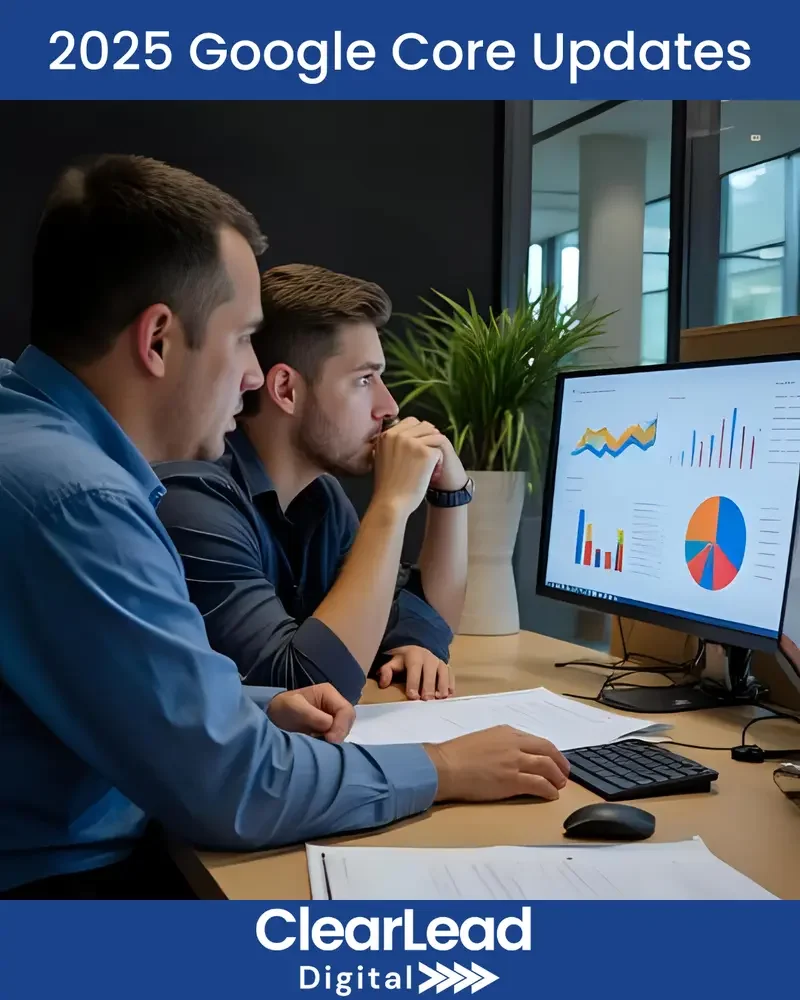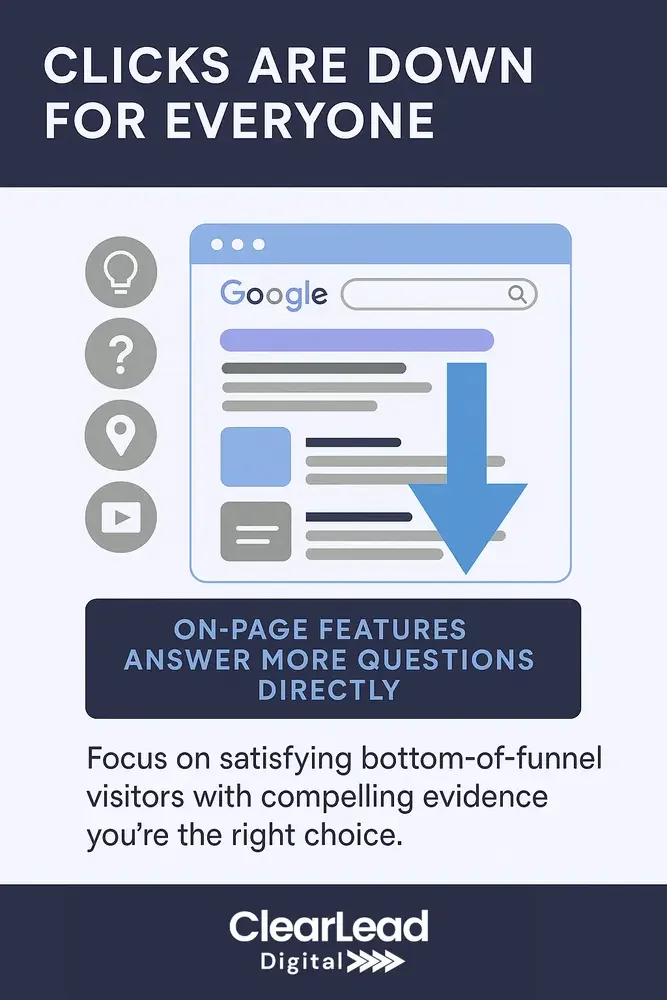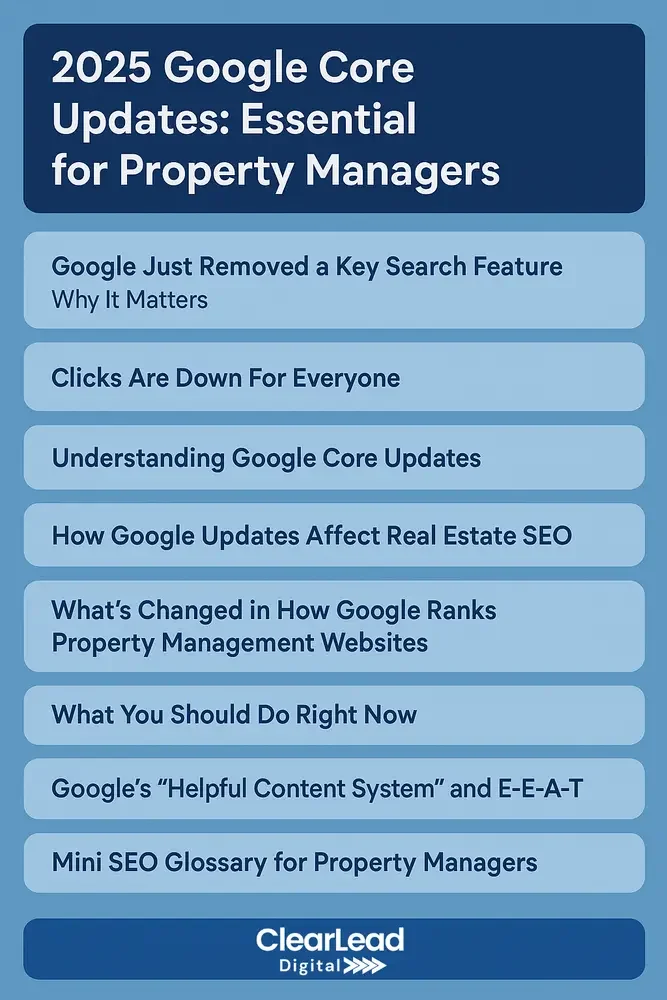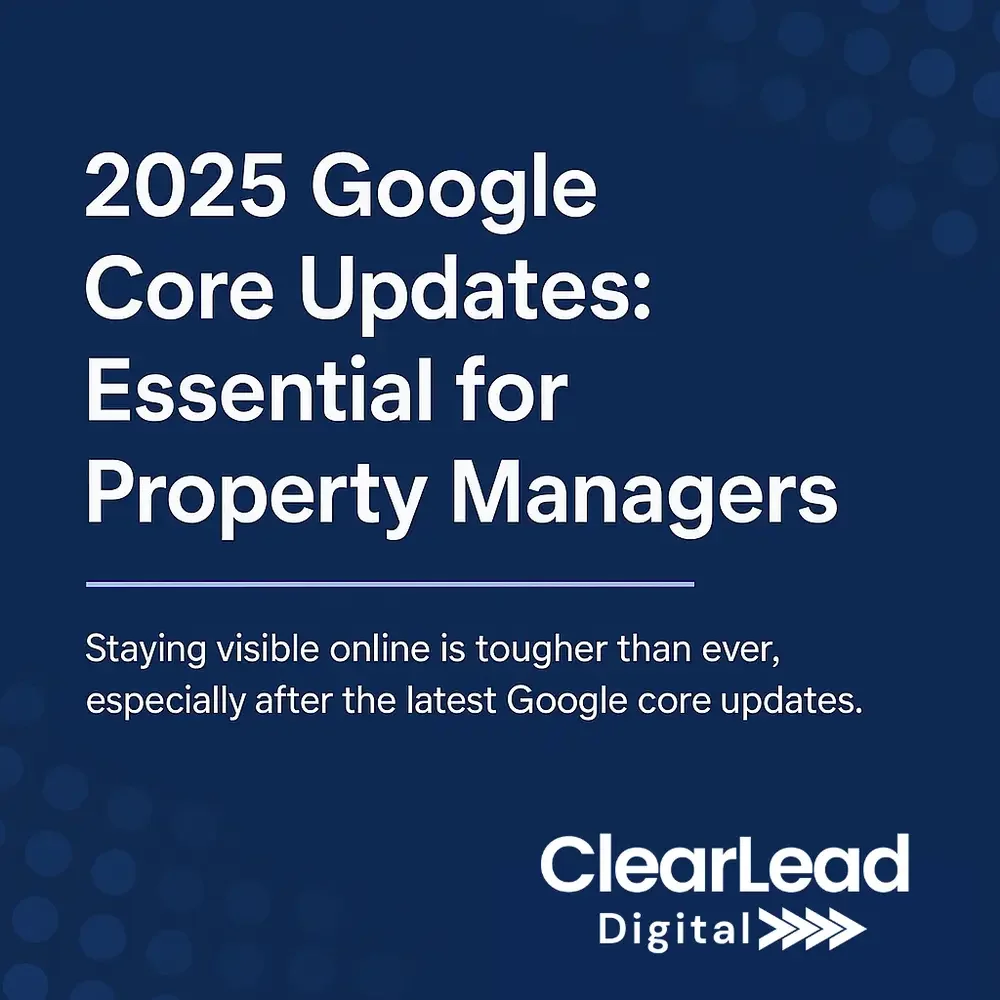2025 Google Core Updates: The Essentials for Property Managers
Staying visible online is tougher than ever, especially after the latest Google core updates. These big Google updates change how websites are ranked, which means your property management company’s spot in search results can move up or down overnight. For many owners, this means fewer clicks, tighter competition, and more pressure to rank on page one. But it’s not all bad news—Google is sending more qualified, bottom-of-the-funnel traffic than ever before. The key is understanding what changed and adapting quickly so your business doesn’t just keep up, but stands out.
Table of Contents
Google Just Removed a Key Search Feature: Why It Matters
Google has removed the option to view 100 results per page in the search results. Most everyday searchers never used it because they rarely scroll past page one. But for rank-tracking tools and marketers, that toggle was important. With the cap back to 10 results, anything below the first page is harder to monitor and practically invisible to users.
That hits rank trackers, bulk SERP audits, and competitive analysis. It also raises the bar for property management SEO: if you’re not top 10, you may not be seen at all. This change also narrows click opportunities across the board, which means the results that do show need to win attention quickly. If you’ve relied on “page two” rankings to deliver a trickle of traffic, that cushion is gone. Now is the time to tighten your on-page strategy and push your most important pages into the top pack with a focused plan and a technical foundation that can hold it.
Clicks Are Down For Everyone
Clicks are down almost everywhere, even for sites that didn’t change a thing. Why? Google answers more questions right on the page (featured snippets, “People Also Ask,” knowledge panels), and there’s more visual clutter from ads, maps, and video carousels. On mobile, fewer results show above the fold, and many users don’t scroll. The removal of the 100-result view only tightens that funnel. The good news: the clicks you still get are usually more bottom-of-funnel—owners ready to hire, or renters ready to apply.
That makes every visit more valuable. Your job is to show visitors right away that you’re the best choice, have a fast website, be upfront about pricing, explain your services clearly, and make it easy to get in touch.. If you’re feeling the dip, don’t chase vanity traffic. Focus on high-intent queries and page experiences that convert.
Understanding Google Core Updates
Google core updates are broad algorithm shifts that re-rank content based on how helpful, relevant, and trustworthy it is. They aren’t penalties. They’re recalibrations. After an update, some pages rise, others fall, depending on how well they meet searcher intent and quality expectations. For property managers, these updates usually affect searches for local services (like “property management in Dallas”) and detailed questions from owners and renters. Core updates often reward depth, originality, and strong user experience.
If your site relies on thin, templated content, expect volatility. The fix isn’t a trick—it’s better pages, better structure, and better proof you’re a credible local operator. Make peace with the fact that updates will keep coming; build a system that improves a little every month so you’re aligned before the next one hits.
How Google Updates Affect Real Estate SEO
Real estate and property management websites often run into problems like duplicate listings, city pages that all sound the same, and generic service descriptions that don’t explain how you really work. Core updates devalue copy-paste patterns and reward real expertise, local knowledge, and transparent process.
A Phoenix page should read differently than a Denver page. An HOA page should explain responsibilities, SLAs, and common pitfalls owners care about. Your rental listing pages should link to helpful renter resources, not just show photos. Use unique neighborhood insights, local ordinances, seasonal issues, and real timelines. The sites that win look like local authorities, not national templates with a logo swap.
What’s Changed in How Google Ranks Property Management Websites
Google’s expectations have grown. It’s not enough to mention keywords; you must satisfy the search. Here’s the short list of what matters most:
| Ranking Factor | What Google Wants Now |
|---|---|
| Content Quality | Clear, original, up-to-date answers with examples and specifics |
| Topical Depth | A cluster of related pages (services, cities, FAQs) linked together |
| Mobile Experience | Tap-friendly, readable, fast; no layout shifts |
| Speed & CWV | Core Web Vitals in the green; compressed images, lean scripts |
| Trust & Proof | Reviews, bios, addresses, pricing ranges, policies |
| Links & Citations | Local chambers, industry sites, real estate partners |
| Engagement | Users scroll, click, call—no pogo sticking |
If your site is a brochure, it’s time to turn it into a resource.
What You Should Do Right Now
Start with a focused, high-leverage sprint on your top 10 pages:
Audit in Search Console: drop-offs, queries lost, pages with falling CTR.
Rewrite weak intros to match search intent in the first 100–150 words.
Add Specifics: fees (even ranges), timelines, processes, owner expectations.
FAQ Blocks: answer six to eight real questions per page; add FAQ schema.
Internal Links: connect blogs → services → city pages; avoid orphan pages.
Speed Wins: compress images, lazy-load media, remove unused JS/CSS.
Conversion: visible phone number, short forms, calendar link, trust badges.
Knock this out, then expand to the next tier of pages.
Google’s “Helpful Content System” and E-E-A-T
Google’s Helpful Content System rewards pages written for people, not bots. Pair that with E-E-A-T—Experience, Expertise, Authoritativeness, Trustworthiness—and you have the blueprint. Share real examples like how you place a tenant in two weeks, how you handle late-night maintenance calls, or how you prevent evictions. Add author bylines with real bios. Publish owner case studies with metrics (vacancy reduction, time-to-lease, maintenance cost control).
Keep policy pages (fees, screening standards) public. All of this shows that you’re a real company doing real work, and that owners can trust you with properties worth hundreds of thousands or even millions of dollars.
Why Authority Is Non-Negotiable Now
Google core updates are increasingly ranking source, not just pages. Authority compounds through signals off your site and on it. Off-site: local chamber memberships, BBB listings, mentions in local media, partnerships with real estate associations, and links from reputable vendors. On your website, that means having detailed service pages, strong local content, staff bios, testimonials from owners (with names when possible), awards, and easy-to-find contact details. Keep reviews flowing steadily; velocity matters as much as quantity.
Encourage owners to write about outcomes, not just stars. Showcase your processes so an owner feels confident before they ever call. Authority reduces ranking volatility after core updates and increases conversion rates at the same time.
How to Build Authority With Content
Turn your site into the best answer in your market:
Neighborhood pages: schools, commute times, rent ranges, HOA quirks, short-term rental rules.
Owner guides: how to choose a manager, fee comparison, make-ready checklists, tax docs.
Renter resources: application standards, pet policies, maintenance FAQs, deposit returns.
Case studies: before/after vacancy charts, lease-up timelines, maintenance savings.
Video & shorts: 60-second answers to common owner questions; embed on key pages.
Connect everything with internal links. Use clear H2/H3 subheads, jump links, and a simple table of contents so visitors can find answers fast.
What Local SEO Still Gets You
Local intent is still the strongest signal in this space. Owners and renters search “property manager near me” or “[city] rental management” when they’re ready to act. Win the Local Pack (map results) and you’ll see steady, high-intent leads. Keep your Google Business Profile complete: services, categories, photos, service areas, and weekly posts.
Ask for reviews after specific wins (fast lease, maintenance success). Use local schema on your site to reinforce NAP consistency. Expand citations on reputable directories (quality over quantity). Remember: local search is a habit channel—steady updates beat one-time overhauls.
Technical SEO: The House Your Rankings Live In
A gorgeous “front yard” (content) won’t matter if the foundation is cracked. Technical SEO protects rankings and conversion:
HTTPS everywhere; fix mixed content.
Core Web Vitals: Largest Contentful Paint < 2.5s, CLS minimal, INP responsive.
Crawlability: XML sitemap, robots.txt tuned, no dead-end (orphan) pages.
Clean architecture: services → cities → neighborhoods; breadcrumbs enabled.
Media discipline: next-gen image formats, lazy-loading, compressed video.
Accessibility: alt text, readable contrast, predictable navigation.
Run monthly checks so theme updates or plugin changes don’t silently tank performance.
Digital Marketing Tips for Property Managers Post-Update
SEO shouldn’t carry the entire load. Layer in channels that amplify trust and keep you visible while rankings move:
Email: monthly owner/renter tips, market updates, fee transparency.
Retargeting: bring back visitors with case studies and review snippets.
Short video: answer one owner question per clip; embed on service pages.
Social proof: repurpose reviews into image cards for socials and your site.
Lead magnets: “First-Time Landlord Starter Kit” or “Make-Ready Checklist” as gated downloads.
This mix builds brand familiarity and shortens the time from search to signed agreement.
Monitoring, Measuring, and Responding to Google Core Updates
Don’t chase daily fluctuations. Watch trends over 4–6 weeks after an update:
Search Console: query shifts, CTR changes, pages losing impressions.
GA4: conversions by page and source; watch engaged sessions.
Rank tracking: focus on top 20 keywords tied to revenue, not vanity terms.
Crawl reports: new 404s, redirect chains, slow templates.
Make focused updates by refreshing your content, add FAQs that answer real questions, link related pages together, and fix any technical issues Google flags. Treat every update like a feedback loop, not a fire drill.
What Not to Do After Google Core Updates
Avoid the classic mistakes:
Don’t mass-delete pages because traffic dipped—many hold long-tail value.
Don’t keyword-stuff as a “fix”—it makes things worse.
Don’t buy spammy links—short-term bumps, long-term risk.
Don’t ignore mobile issues—most prospects are on phones.
Don’t wait it out—ship improvements while the dust settles.
Instead, identify what the update rewarded, then make your pages the best example of that standard. Small weekly improvements beat big sporadic overhauls.
How ClearLead Digital Helps You Stay Visible
If you’re tired of guessing, we’ll give you clarity and a plan. ClearLead Digital helps property managers:
Diagnose ranking drops with data you can understand.
Prioritize the fixes that move revenue (not just traffic).
Build city and service pages that actually rank and convert.
Strengthen local signals: GBP, reviews, citations, and local links.
Speed up your site so every visit counts.
We work like an extension of your team—clear communication, no jargon, and results tied to signed management agreements, not vanity metrics.
Mini SEO Glossary for Property Managers
Core Update: A broad Google algorithm change that reshuffles rankings.
E-E-A-T: Experience, Expertise, Authoritativeness, Trustworthiness—quality signals in content.
SERP: Search Engine Results Page—the screen of results a user sees.
Local Pack: The three map listings Google shows for local intent searches.
Schema Markup: Code that helps Google understand your content type (FAQ, LocalBusiness, etc.).
Core Web Vitals: Speed, responsiveness, and stability metrics that affect rankings and UX.
Topical Cluster: A group of related pages interlinked to build subject authority.
Zero-Click Result: An answer on Google that doesn’t require a click to a website.
Final Thoughts
Two things can be true at once: clicks are down, and opportunity is up. Now that the 100-result option is gone and Google keeps updating its system, only the pages on page one will get clicks, and those clicks will mostly come from serious owners and renters ready to take action. Your edge comes from being the most helpful local authority with a site that loads quickly, reads clearly, and proves you’re trustworthy.
Don’t chase hacks. Build durable visibility with better content, better experience, and better proof. If you want a partner who knows property management and lives in the SEO trenches, we’re here to help.
FAQs
-
Google released major updates in 2025, including the March and June 2025 Core Updates, which focused on rewarding helpful, expertise-driven content while penalizing low-value, unedited AI-generated content. The June update, which ran from late June to mid-July, particularly targeted thin and unhelpful content, and caused volatility in search rankings across various industries. Additionally, Google released the August 2025 Spam Update, a periodic refresh aimed at content-related spam policies, and SEO in 2025 continues to evolve, emphasizing user intent, E-E-A-T (Experience, Expertise, Authoritativeness, and Trustworthiness), and overall content quality over manipulative tactics.
Key Google Updates in 2025:
This broad update focused on improving search quality and surfacing relevant content.
Rolled out from June 30 to July 17, this update specifically targeted low-value content, including thin, short-form content and unedited AI-generated text. Websites without human review or editing for AI content were likely to see ranking declines.
This update focused on content-related spam, reinforcing Google's commitment to penalizing sites that violate its spam policies.
Key Changes and Focus Areas:
User Intent and Helpful Content:
A major focus of the 2025 updates is to provide content that truly satisfies user search intent and offers real value, clear explanations, and trustworthiness.
E-E-A-T:
Google places a high premium on E-E-A-T (Experience, Expertise, Authoritativeness, and Trustworthiness) to identify high-quality content.
AI-Generated Content:
Unedited or low-value AI content is being heavily targeted. Google's quality raters are instructed to assign the lowest possible value to such content, even if it comes from a site with high domain authority.
Thin and Low-Value Content:
Pages and posts lacking depth and substantial value are likely to be penalized by the updates.
Technical and Quality Issues:
Poor website quality, slow loading times, and technical issues can still negatively impact rankings during core updates.
What to Do for SEO in 2025:
Focus on Helpful Content:
Create content that demonstrates real experience, expertise, and is thoroughly reviewed and edited by humans, especially if using AI tools.
Address Search Intent:
Ensure your content directly answers the questions your audience is asking.
Improve E-E-A-T:
Showcase the experience and expertise behind your content to build trust and authority.
Fix Low-Value Pages:
Identify and improve or remove pages that offer little value to users.
Review Spam Policies:
Ensure your site complies with Google's spam policies to avoid ranking penalties from updates like the August Spam Update.
AI responses may include mistakes. Learn more
-
Be prepared for future core updates
It's just as important to keep your site buttoned up from a technical and E-E-A-T standpoint. Ensure your bylines are transparent, author and About pages are well-developed, and your site conveys trust and expertise at every turn.
-
Yes, SEO remains highly relevant in 2025, but it is evolving to adapt to advancements like AI and generative search. While traditional strategies are still important, effective SEO in 2025 requires a focus on creating high-quality content, prioritizing user experience, building authority through backlinks, and optimizing for generative engine optimization (GEO) and new AI-driven platforms.
-
Clicks dropped because Google core updates reshuffle rankings and because search results now include more zero-click features like featured snippets, AI summaries, and maps that reduce click-through opportunities.
-
Yes. Local SEO is critical for property managers because most searches for management services are local in intent. Optimizing your Google Business Profile, reviews, citations, and city pages helps capture ready-to-hire leads.
-
Start by auditing your top 10 pages in Google Search Console. Improve content depth, add FAQs, strengthen internal linking, and resolve technical issues like speed or mobile usability. This helps stabilize rankings after core updates.




